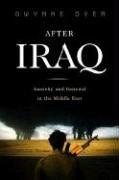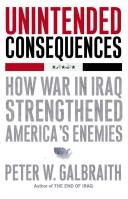| Listing 1 - 10 of 19 | << page >> |
Sort by
|

ISBN: 1403967245 Year: 2005 Publisher: New York (N.Y.) Palgrave Macmillan
Abstract | Keywords | Export | Availability | Bookmark
 Loading...
Loading...Choose an application
- Reference Manager
- EndNote
- RefWorks (Direct export to RefWorks)
Book
ISBN: 9780297853121 Year: 2008 Publisher: London : Weidenfeld & Nicolson,
Abstract | Keywords | Export | Availability | Bookmark
 Loading...
Loading...Choose an application
- Reference Manager
- EndNote
- RefWorks (Direct export to RefWorks)
Book
ISBN: 9781498508971 Year: 2016
Abstract | Keywords | Export | Availability | Bookmark
 Loading...
Loading...Choose an application
- Reference Manager
- EndNote
- RefWorks (Direct export to RefWorks)
The United States is in need of a major change in approach if it is to maintain both its leadership and its credibility in the Muslim world. The political leadership in Washington naively and unrealistically assumes that it can impose its style of governance and way of thinking to make the Muslim world secular and democratic based on Western values. This volume constructively criticizes and objectively analyzes the present American political strategy to make possible an honest national debate about American foreign policy toward the Muslim world. This book questions the judgment of American foreign policy makers and argues that the United States has no coherent policy in place to address ongoing challenges. It highlights the need for creative thinking, flexibility, systematic understanding, cultural awareness, and effective strategy.
Book
ISBN: 9780815737407 Year: 2020 Publisher: Washington, : Brookings Institution Press,
Abstract | Keywords | Export | Availability | Bookmark
 Loading...
Loading...Choose an application
- Reference Manager
- EndNote
- RefWorks (Direct export to RefWorks)
U.S. policy in the Middle East has had very few successes in recent years, so maybe it's time for a different approach. But is the new approach of the Trump administration - military disengagement coupled with unquestioning support for key allies-Israel, Egypt, and Saudi Arabia - the way forward ? In this edited volume, noted experts on the region lay out a better long-term strategy for protecting U.S. interests in the Middle East. The authors articulate a vision that is both self-interested and carefully tailored to the unique dynamics of the increasingly divergent sub-regions in the Middle East, including North Africa, the Sunni Arab bloc of Egypt and Persian Gulf states, and the increasingly chaotic Levant. The book argues that the most effective way to pursue and protect U.S. interests is unlikely to involve the same alliance-centric approach that has been the basis of Washington's policy since the 1990s. Instead, the United States should adopt a nimbler and less military-dominant strategy that relies on a diversified set of partners and a determination to establish priorities for American interests and the use of resources, both financial and military. In essence, the book calls for a new post-Obama and post-Trump approach to the region that reflects the fact that U.S. interests are changing and likely will continue to change.

ISBN: 9780312378455 Year: 2008 Publisher: New York : Thomas Dunne Books,
Abstract | Keywords | Export | Availability | Bookmark
 Loading...
Loading...Choose an application
- Reference Manager
- EndNote
- RefWorks (Direct export to RefWorks)

ISBN: 9781416562252 Year: 2008 Publisher: New York : Simon & Schuster,
Abstract | Keywords | Export | Availability | Bookmark
 Loading...
Loading...Choose an application
- Reference Manager
- EndNote
- RefWorks (Direct export to RefWorks)
Book
ISBN: 9948007328 Year: 2005 Publisher: Abu Dhabi : Emirates Center for Strategic Studies and Research,
Abstract | Keywords | Export | Availability | Bookmark
 Loading...
Loading...Choose an application
- Reference Manager
- EndNote
- RefWorks (Direct export to RefWorks)
Book
ISBN: 9780415727266 9781315852546 9781317918998 9781317919001 9781138097162 Year: 2016 Publisher: London ;New York Routledge
Abstract | Keywords | Export | Availability | Bookmark
 Loading...
Loading...Choose an application
- Reference Manager
- EndNote
- RefWorks (Direct export to RefWorks)
The promotion of 'democracy' abroad has been a feature of US foreign policy since the earlier part of the twentieth century, accompanying its rise as an international actor. It provided the ideological basis for its opposition to rivals in the form of imperialism, fascism and then communism. The end of the Cold War, which signalled the emergence of the US as the sole superpower, accelerated this process. With the ideological fusion of democracy and capitalism credited in large measure for the defeat of communism and the state-planned economy, the promotion of democracy alongside capitalism as the only viable, legitimate mode of governance emerged as an increasingly important component of US foreign policy. Countries as diverse as the Philippines, Chine and Poland have all been subject to US democracy promotion initiatives. In the Middle East though, the US traditionally engaged authoritarian governments as a means of ensuring its core interests in the region. However the terrorist attacks of September 11, 2001, and the G.W. Bush administration's perception of the Middle East's 'democratic deficit' as the underlying cause, initiated a significant departure in the traditional direction of US foreign policy. Democracy promotion subsequently emerged as a central tenet of US policy to the Middle East. This book argues that, as part of the strategy of democracy promotion in the Middle East, the US has sought to gradually replace proxy authoritarian governments with elite-based democracies. From a neo-Gramscian perspective, this strategic shift can be seen as a move from coercive to consensual forms of social control, the underlying aim being to ensure a more enduring form of stability in the states concerned. This is part of a long-term US strategy, evidenced prior in other regions such as Latin America, which ultimately aims at the achievement of a Gramscian hegemony; that is the internalisation by other societies of the US's interpretation of 'democracy' as the natural order. Utilising an analytical framework derived from the neo-Gramscian approach, the book focuses in main on the Clinton (1993-2001) and G. W. Bush (2001-2009) administrations, using the case studies of Egypt, Iraq and Kuwait to deconstruct the US strategy of democracy promotion in the Middle East.
Book
ISBN: 9780415410496 9780203928301 9781134128938 9781134128976 9781134128983 9780415410489 Year: 2008 Publisher: London New York Routledge
Abstract | Keywords | Export | Availability | Bookmark
 Loading...
Loading...Choose an application
- Reference Manager
- EndNote
- RefWorks (Direct export to RefWorks)
Book
ISBN: 9780670026449 Year: 2013 Publisher: New York : Viking,
Abstract | Keywords | Export | Availability | Bookmark
 Loading...
Loading...Choose an application
- Reference Manager
- EndNote
- RefWorks (Direct export to RefWorks)
| Listing 1 - 10 of 19 | << page >> |
Sort by
|

 Search
Search Feedback
Feedback About UniCat
About UniCat  Help
Help News
News